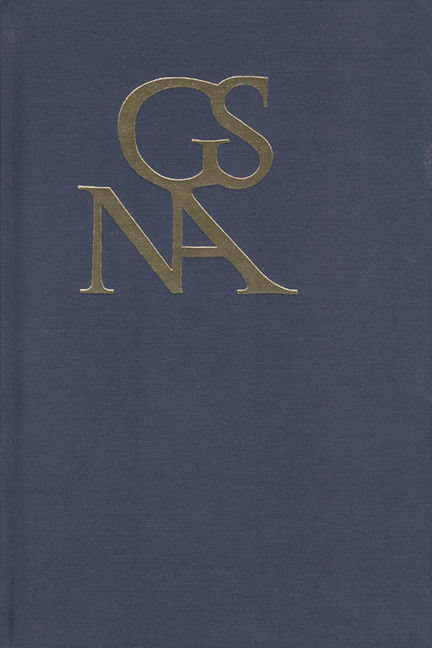Book contents
- Frontmatter
- Contents
- Reorientations around Goethe
- Reorientations around Goethe II
- Special Section on Goethe's Narrative Events edited by Fritz Breithaupt
- What Is an Event for Goethe?
- Much Ado about Nothing? The Absence of Events in Die Wahlverwandtschaften
- Countering Catastrophe: Goethe's Novelle in the Aftershock of Heinrich von Kleist
- Narrating (against) the Uncanny: Goethe's “Ballade” versus Hoffmann's Der Sandmann
- Remembering Klopstock's Mitausdruck
- Strategic Indecision: Gender and Bureaucracy in Schiller's Maria Stuart
- The Dark Green in the Early Anthropocene: Goethe's Plants in Versuch die Metamorphose der Pflanzen zu erklären and Triumph der Empfindsamkeit
- Abschlussbewegungen: Goethe, Freud, and Spectral Forms of Life
- Ein Mythos und sein doppelter Entzug des Modernen: Prämissen für einen Ausweg aus der Unübersichtlichkeit der Faustforschung
- Johann Wolfgang von Goethe in Conversation with Things
- World Literature Turns Political, 1835/36: The Early Afterlife of Goethe's Pronouncement in German Cultural-Politics and in the Young Germany Movement
- Fritz Strich and the Dilemmas of World Literature Today
- A Jewish Faust Commentary: Notes on Franz Rosenzweig's The Star of Redemption
- From Idylle to idílio: Mário de Andrade's Parody of Hermann und Dorothea
- Koselleck's Timely Goethe?
- Book Reviews
Much Ado about Nothing? The Absence of Events in Die Wahlverwandtschaften
from Special Section on Goethe's Narrative Events edited by Fritz Breithaupt
Published online by Cambridge University Press: 26 June 2019
- Frontmatter
- Contents
- Reorientations around Goethe
- Reorientations around Goethe II
- Special Section on Goethe's Narrative Events edited by Fritz Breithaupt
- What Is an Event for Goethe?
- Much Ado about Nothing? The Absence of Events in Die Wahlverwandtschaften
- Countering Catastrophe: Goethe's Novelle in the Aftershock of Heinrich von Kleist
- Narrating (against) the Uncanny: Goethe's “Ballade” versus Hoffmann's Der Sandmann
- Remembering Klopstock's Mitausdruck
- Strategic Indecision: Gender and Bureaucracy in Schiller's Maria Stuart
- The Dark Green in the Early Anthropocene: Goethe's Plants in Versuch die Metamorphose der Pflanzen zu erklären and Triumph der Empfindsamkeit
- Abschlussbewegungen: Goethe, Freud, and Spectral Forms of Life
- Ein Mythos und sein doppelter Entzug des Modernen: Prämissen für einen Ausweg aus der Unübersichtlichkeit der Faustforschung
- Johann Wolfgang von Goethe in Conversation with Things
- World Literature Turns Political, 1835/36: The Early Afterlife of Goethe's Pronouncement in German Cultural-Politics and in the Young Germany Movement
- Fritz Strich and the Dilemmas of World Literature Today
- A Jewish Faust Commentary: Notes on Franz Rosenzweig's The Star of Redemption
- From Idylle to idílio: Mário de Andrade's Parody of Hermann und Dorothea
- Koselleck's Timely Goethe?
- Book Reviews
Summary
AS FRITZ BREITHAUPT notes in the introduction to this section, the paradigmatic event for Goethe is the event-that-should-not-be. In Die Wahlverwandtschaften (Elective Affinities), almost the entire novel consists of events-that-should-not-be from the macro level—the wrong people fall in love, the captain's neighbor drowned, Otto, Ottilie, and Eduard die—to the micro level—the placement of the summer house is wrong, the cornerstonelaying ceremony goes awry, Charlotte relandscapes the cemetery, Luciane retraumatizes a young woman responsible for the death of her sibling, the British lord and his companion offend when they mean to ingratiate, and, through it all, Mittler's help does more harm than good.
The novel is full of such events, but that is not necessarily the impression it leaves. If we consult Wolf Schmid's criteria for a narrative event—relevance, unpredictability, effect, irreversibility, non-iterativity—we may begin to see why. Many of the smaller events lack relevance, have no effect, and/ or are variations (and hence iterations) of occurrences in the central plot. The main characters spend a good deal of their time refusing to acknowledge the effects and irreversibility of Eduard and Ottilie's love, which is perhaps the central fact of the novel, but may itself be too processual and predictable to qualify as an event in Schmid's sense. In short, the events-that-should-notbe are so convincing, either in their ineffectivity or the characters’ efforts to render them ineffective, that it can seem as though there are no events at all. This results, however, in a curious reversal: while Lisa Anderson and Christian Weber demonstrate how Goethe neutralizes the traumatic and uncanny effects of events in the Novelle and “Ballade,” in this novel, the characters attempt to neutralize the socially catastrophic effects of events and thereby produce traumatic and uncanny effects in their stead.
The characters try to avoid the disruptive events-that-should-not-be in the present both by ignoring them, through the social forms of everyday politeness, and by misreading them as a repetition of a past whose significance they already know. I shall demonstrate in particular how this second strategy works, and how the role of the past has often been underestimated in understanding character motivation in Die Wahlverwandtschaften because of its dispersed and ambiguous exposition.
- Type
- Chapter
- Information
- Goethe Yearbook 26Publications of the Goethe Society of North America, pp. 49 - 64Publisher: Boydell & BrewerPrint publication year: 2019



